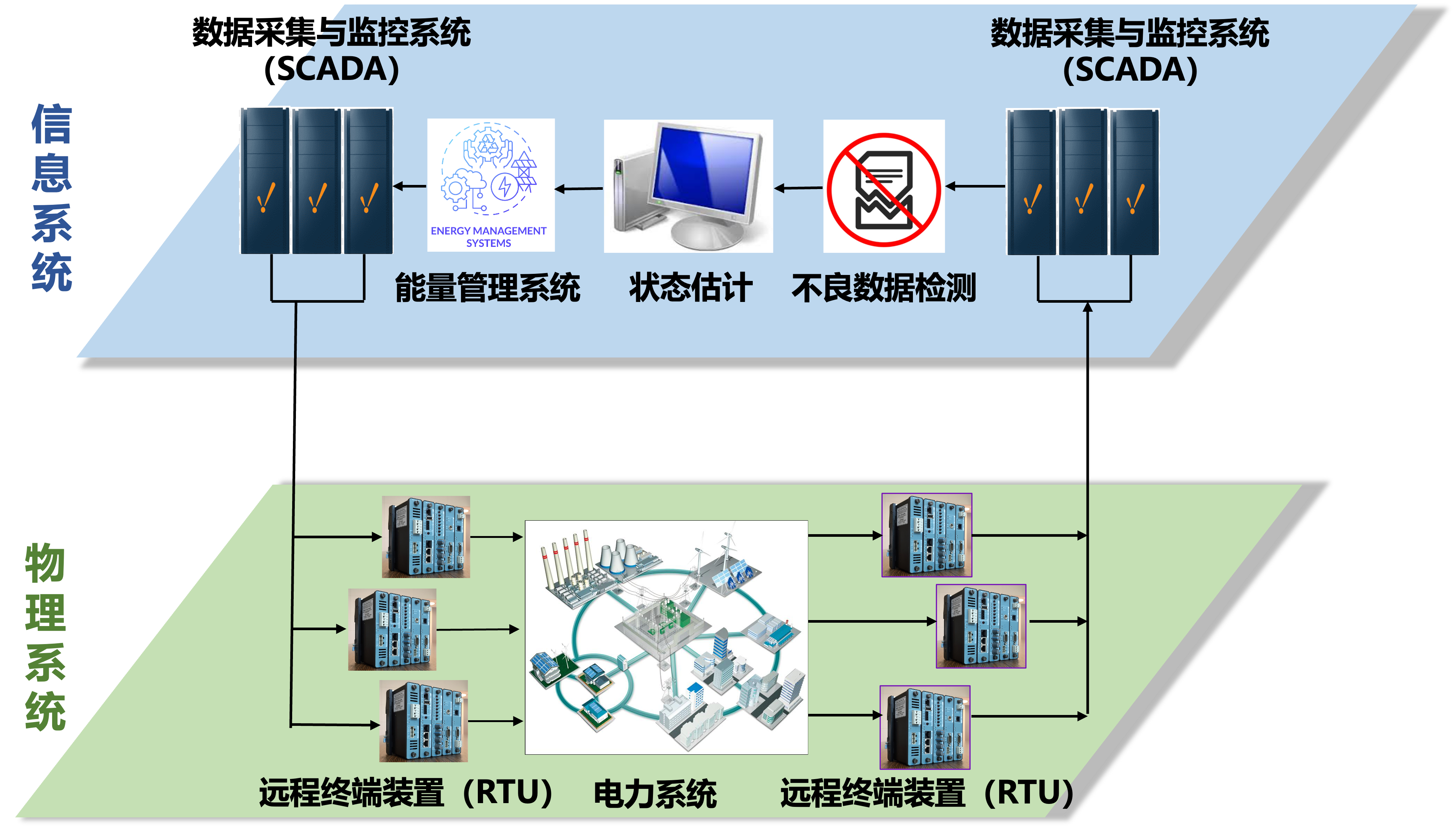Ke Sun | Shanghai University | Research
Cybersecurity of Cyber-Physical Systems
Cyber-Physical Systems (CPSs) are engineered systems that integrate computational elements (cyber systems) with physical processes (physical systems), creating a feedback loop where physical processes are monitored and controlled by computer algorithms. A representative example is the Smart Grid, illustrated in the figure below. While the seamless integration of cyber and physical domains significantly enhances operational efficiency and usability, it also introduces emerging cyberthreats and evolving attack trends.

The asymmetry in which attackers operate in the dark while defenders operate in the open becomes dramatically amplified in CPS environments. Attackers can not only exploit conventional vulnerabilities through prolonged covert infiltration, but also obtain highly system-specific knowledge such as industrial communication protocols and control logic, thereby gaining the capability to launch precise, physically damaging attacks. Meanwhile, defenders often lack clear understanding of how much critical system knowledge the adversary has already acquired. This profound cognitive disadvantage forces defense strategies into a reactive and highly passive position. To address this imbalance, it is imperative to transition from passive protection to proactive resilience. This shift requires constructing realistic attack models, simulating adversarial behaviors, inferring potential unknown attack vectors, and developing corresponding targeted countermeasures.
Selected Publications:K. Sun*, I. Esnaola, A. M. Tulino and H. V. Poor, ‘‘Asymptotic learning requirements for stealth attacks on linearized state estimation,’’ IEEE Trans. Smart Grid, vol. 14, no. 4, pp. 3189 - 3200, Jul. 2023.
K. Sun and Z. Li*, ‘‘Sparse data injection attacks on smart grid: An information-theoretic approach,’’ IEEE Sensors Journal, vol. 22, no. 14, pp. 14553 - 14562, Jul. 2022.
K. Sun*, I. Esnaola, S. M. Perlaza, and H. V. Poor, ‘‘Stealth attacks on the smart grid,’’ IEEE Trans. Smart Grid, vol. 11 , no. 2, pp. 1276-1285, Mar. 2020.
The deep integration between cyber and physical components means that threats originating in the cyber domain can directly translate into tangible consequences in the physical world. At its core, CPS embodies the concept of cyber-enabled control, where tampering, spoofing, or disrupting information flows may be propagated through controllers and actuators, ultimately altering real-world system states. Such cross-domain propagation enables a seemingly routine cyber intrusion to escalate into equipment failure, large-scale operational disruption, or even major safety incidents. To address these risks, it is essential to perform integrated and quantifiable risk assessments that jointly consider both cyber vulnerabilities and physical impacts.
Selected Publications:C. Deng, Y. Li, Q. Liu*, X. Zheng, K. Sun*, Quantitative Risk Assessment for Autonomous Vehicles: Integrating Functional Resonance Analysis Method and Bayesian Network,’’ Quality and Reliability Engineering International, vol. 41, no. 3. pp.970 - 991, Apr. 2025.
Q. Liu, K. Sun, W. Liu, Y. Li*, X. Zheng, C. Cao, J. Li. and W. Tao, ‘‘Quantitative risk assessment for connected automated vehicles: Integrating improved STPA-SafeSec and Bayesian network,’’ Reliability Engineering & System Safety, vol. 253, pp.110528, Jan. 2025.
Y. Li, C. Huang, Q. Liu, X. Zheng, and K. Sun*, ‘‘Integrating security in hazard analysis using STPA-Sec and GSPN: A case study of automatic emergency braking system,’’ Computers & Security, vol. 142, pp. 103890, Jul. 2024.
AI Security (one of my new research directions)
In the current era, artificial intelligence technology is advancing rapidly, and multimodal large models have been widely applied in high-security-demand scenarios such as intelligent driving, smart customer service, content creation, and medical diagnosis. These scenarios impose extremely high requirements on the safety, reliability, and compliance of large models. However, multimodal large models still face systemic endogenous security risks in cross-modal integration, including opaque reasoning, susceptibility to hallucinations in generation, difficulties in value alignment, and challenges in eliminating harmful knowledge. Therefore, there is an urgent need to conduct collaborative and innovative research from theoretical, technological, and application perspectives to build multimodal large model systems with endogenous safety features, ensuring their trustworthiness, controllability, and usability throughout their entire lifecycle in dynamic, open, and adversarial environments.
Selected Publications:K. Sun, Y. Li, S. Xie*, and X. Zheng, ‘‘Vulnerability Mining and Integrated Security Protection Framework for Unmanned Systems,’’ Artificial Intelligence Security, vol. 3, no. 4, pp. 65-71, Dec. 2024. (in Chinese)